Imagine this: You’re about to push a major release.
Everything looks good until QA hits a wall.
Regression bugs pop up. Manual testing can’t keep up. Deadlines slip.
Frustration builds.
This is the real-world chaos many growing startups and enterprises face.
That’s exactly why automation testing tools exist as force multipliers for fast-moving teams.
At Seven Square Tech, we’ve helped startups and enterprises to move faster by automating what matters.
We don’t just pick the best automation testing tools from a list.
We match the best automation testing tools to the problem at hand.
In this blog, we’ll share a real-world take on the top automation testing tools in 2025, how they compare, and how to choose the right one for your business.
Key Trends to Look Out for Automation Testing in 2025
- AI-Powered Testing: AI-based tools can predict test failures, self-heal broken tests, and optimize testing workflows.
- Cloud-Based Testing Solutions: Cloud platforms allow scalable and remote testing to reduce infrastructure costs.
- Codeless Test Automation: No-code and low-code automation make testing accessible for non-technical users and speed up the process.
There are so many automation testing tools available and choosing the right one can be difficult.
In this blog, we will help you find the best automation testing tools to meet your requirements.
Whether you are looking for AI-powered solutions, open-source testing tools, or enterprise-level automation software you will get all the details here.
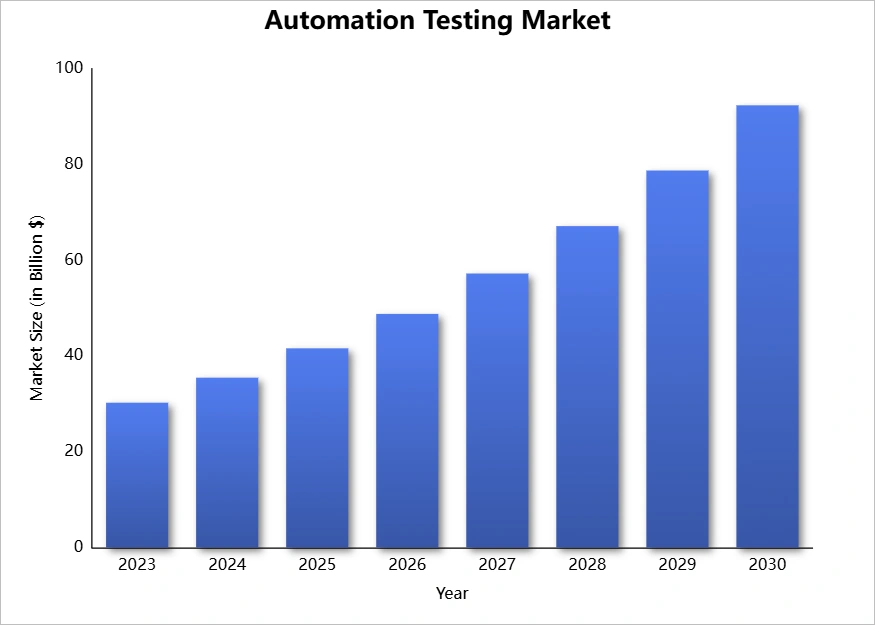
Source: Grand View Research
What Is Automation Testing (and Why It Fails for Some)?
Automation testing is using tools and scripts to run tests on software automatically, speeding up delivery and reducing human error.
But automation testing tools don’t magically solve testing problems.
Poor tool choice, lack of strategy, or unscalable architecture? That’s where it breaks down.
That’s why a proper test automation tools comparison matters. And that’s why we wrote this.
What Makes a Great Automation Testing Tool?
Not all automation testing tools are created equal.
The right tool can make software testing faster, more efficient, and less error-prone but how do you choose the best one?
Here are the key features for selecting a software testing tool in 2025.
Key Features to Look for in Automation Testing Tools
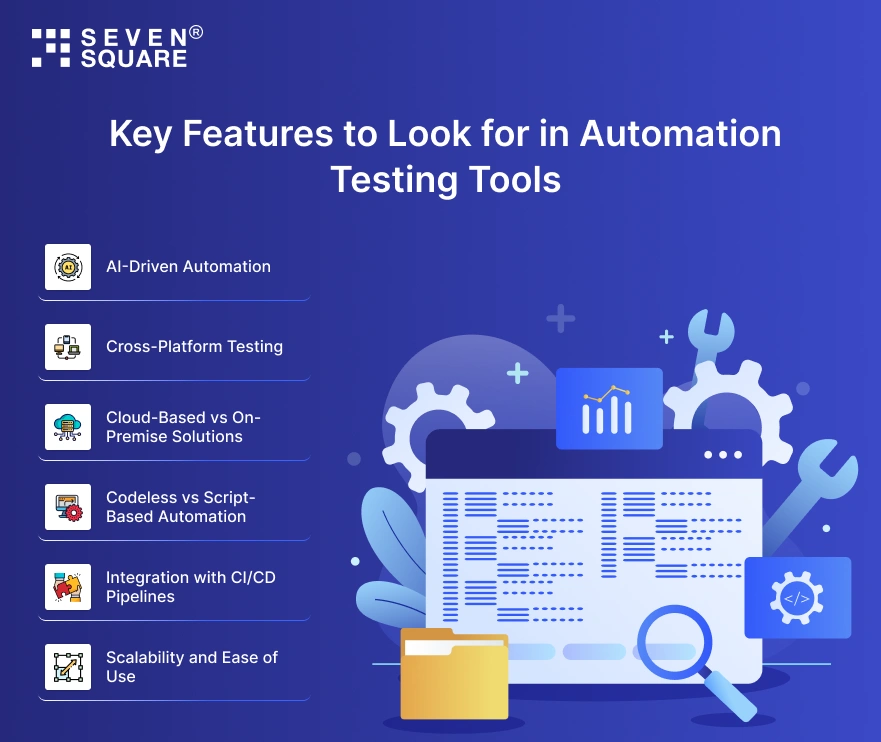
1. AI-Driven Automation
- AI-powered tools can self-heal broken tests, predict failures, and optimize testing workflows.
- This reduces test maintenance and improves accuracy.
2. Cross-Platform Testing
- A great tool should support automated UI testing for websites, mobile apps, and desktop applications.
- This ensures consistent performance on different platforms.
3. Cloud-Based vs On-Premise Solutions
- Cloud-based software testing tools allow remote teams to test applications from anywhere, anytime.
- On-premise tools provide better control over security and data privacy. Choose the one that fits your needs best.
4. Codeless vs Script-Based Automation
- Codeless test automation tools help non-programmers automate tests while script-based tools provide more flexibility for experienced testers.
5. Integration with CI/CD Pipelines
- A powerful automation testing tool should integrate with DevOps pipelines to make it easy to run tests automatically after code changes.
6. Scalability and Ease of Use
- Whether you are a startup or a large enterprise, your test automation tool should scale with your needs & be easy to set up, run, and maintain.
Why Choosing the Right Software Testing Tool Matters?
The right automation testing tool can save time, reduce costs, and improve overall software quality. Here’s why it matters:
- Saves Time and Cost: Automating repetitive tests speeds up development and minimizes the need for manual testing.
- Reduces Human Errors: Automated tests follow the same steps perfectly every time & catch issues that manual testers might miss.
- Ensures Faster Automated UI Testing and Software Delivery: With continuous testing, teams can release software faster, ensuring a smooth user experience.
What are the Top 10 Automation Testing Tools of 2025?
Choosing the right software testing tool can make a real difference in faster, more reliable, and more efficient automation testing.
Whether you need AI-powered testing, cross-browser automation, or codeless test creation there’s a perfect tool for every need.
Here you can explore the top 10 automation testing tools of 2025 including their key features, pros, cons, and best use cases.
1. Selenium: Best for Open-Source Automated UI Testing
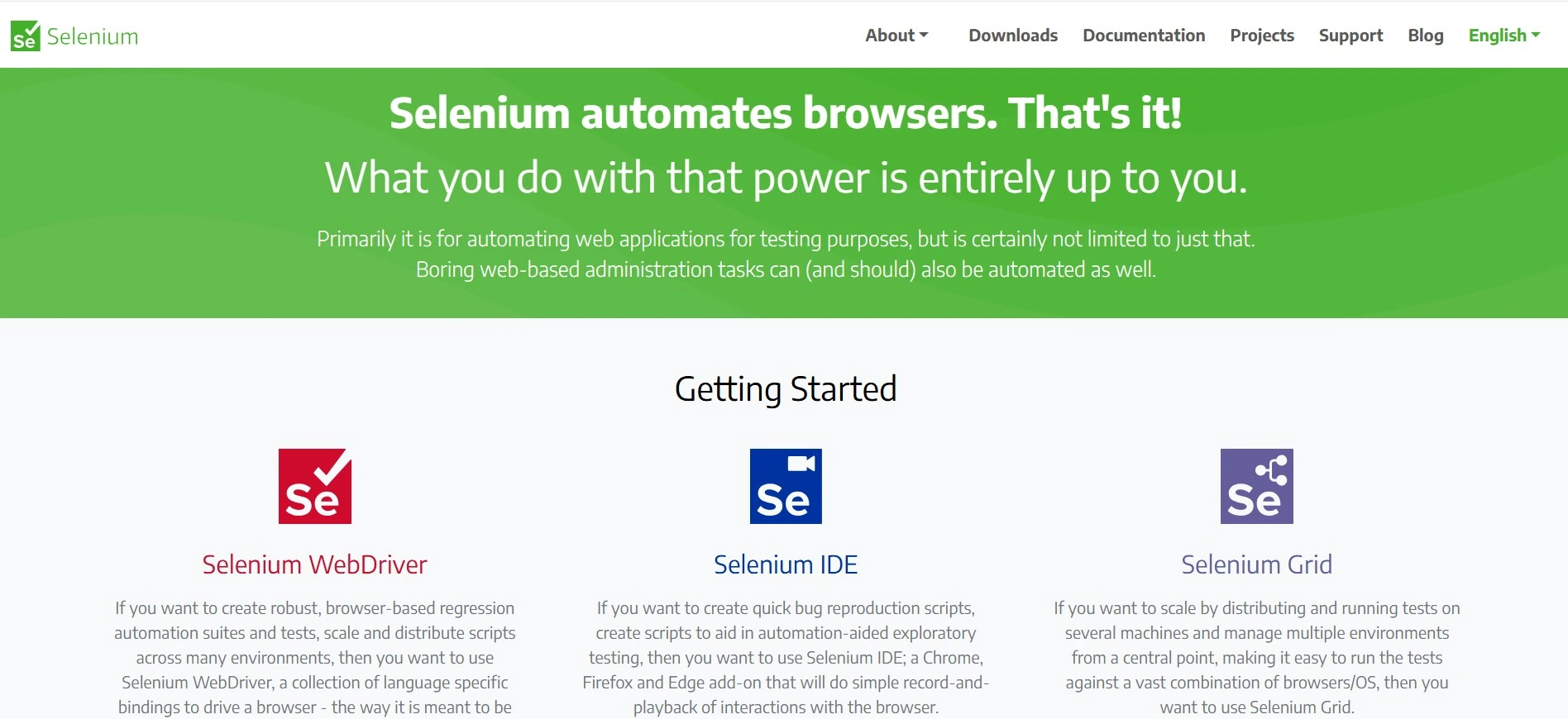
When we talk about the top automation testing tools in 2025, it’s hard to start the conversation without Selenium.
It’s open-source, battle-tested, and built for scale, exactly what you want when you’re dealing with large test suites or multi-browser compatibility.
Most teams love Selenium because it lets you bring your own language and run tests across browsers like Chrome, Firefox, Safari, and Edge.
Just because it’s the most well-known doesn’t mean it’s the only answer.
At Seven Square, we’ve built custom QA automation pipelines where Selenium plays a role, but we always evaluate what makes the most sense for the client’s product lifecycle.
Key Features:
- Cross-platform and cross-browser compatibility: Test your apps on Windows, macOS, and Linux without rewriting a line.
- Language flexibility: Supports popular languages like Python, Java, JS, Ruby, and C#, making it ideal for cross-functional teams.
- Scalable test architecture: Perfect for complex test suites in enterprise-grade projects.
- Smooth CI/CD integration: Works well with Jenkins, GitHub Actions, CircleCI, and more.
- Massive community: Open-source with tons of documentation, tutorials, and GitHub discussions to troubleshoot fast.
It’s not just a tool, it’s a testing ecosystem.
It remains one of the best automation testing tools in the game, we always advise teams to consider their needs before defaulting to it.
Sometimes, a more visual or code-free tool might be a better fit.
2. TestComplete: Best for Codeless Test Automation
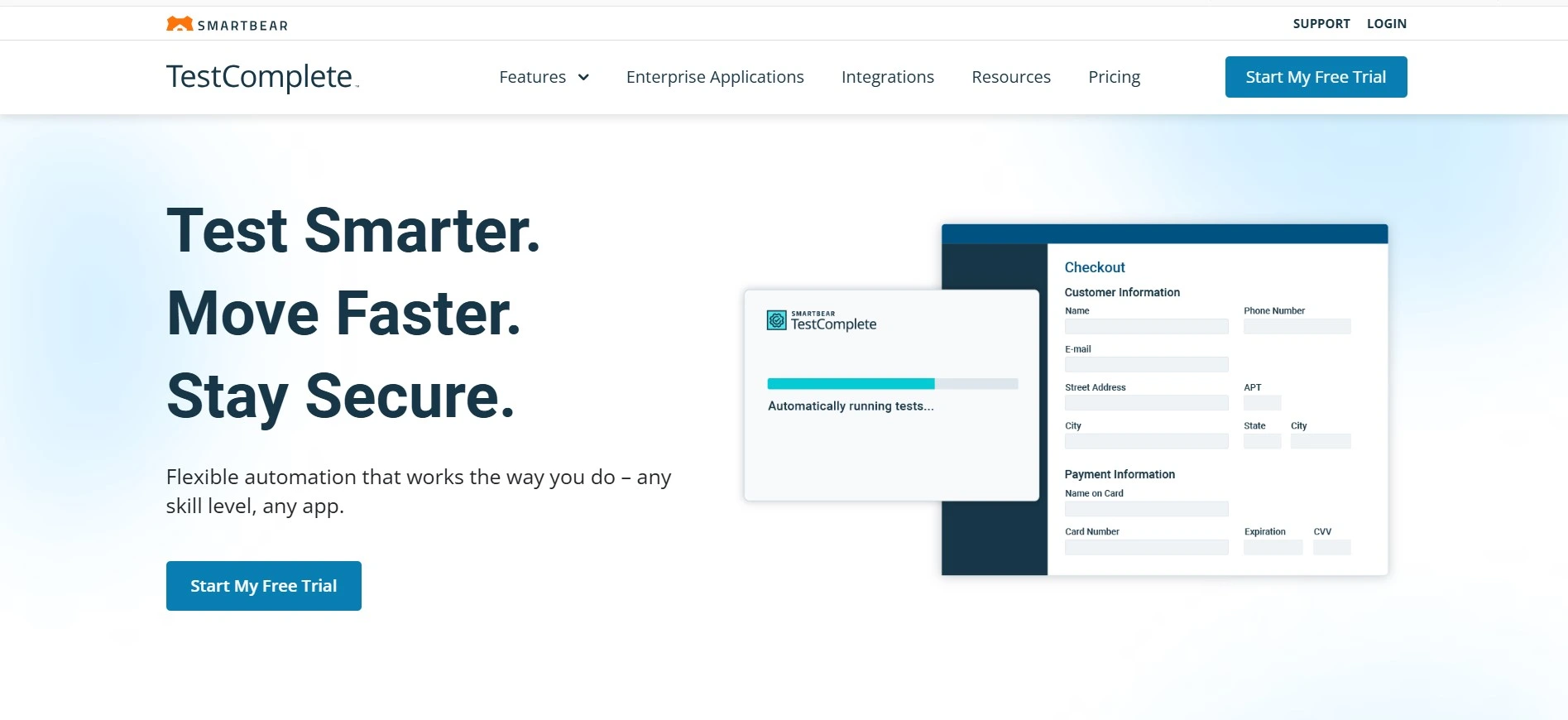
TestComplete by SmartBear is a powerful UI test automation tool that supports desktop, mobile, and web applications.
Its user-friendly interface and robust scripting capabilities make it a top choice among the best automation testing tools.
Key Features:
- Scripted and Scriptless Testing: Offers both keyword-driven testing and scripting in languages like Python, VBScript, and JavaScript.
- Object Recognition Engine: Accurately identifies dynamic UI elements, reducing test maintenance.
- Parallel Test Execution: Accelerates testing by running multiple tests simultaneously.
- CI/CD Integration: Smoothly integrates with Jenkins, Azure DevOps, and other CI/CD tools.
For teams who want top automation tools for software testing, TestComplete provides a versatile platform that fulfills various testing needs.
3. Playwright: Best for Codeless Test Automation
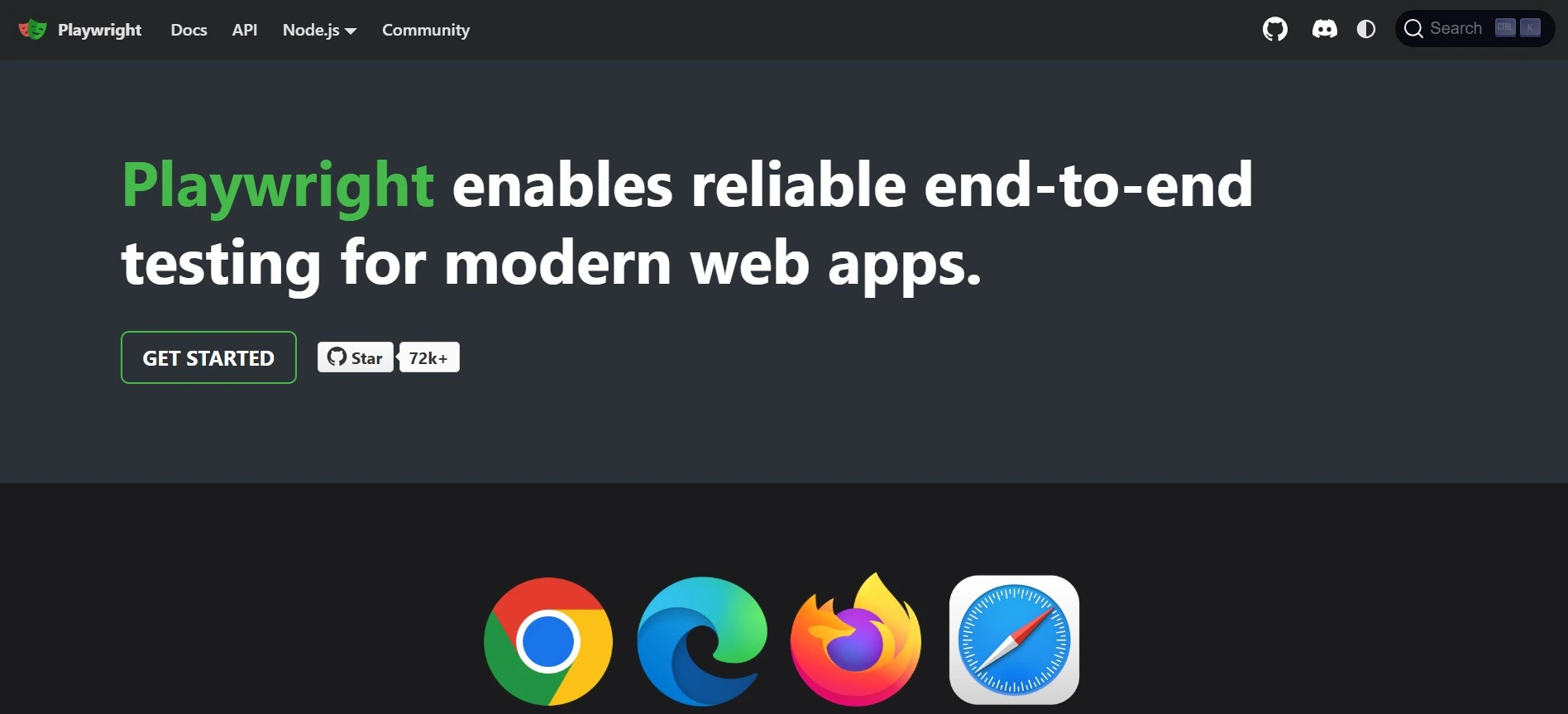
Developed by Microsoft, Playwright is an open-source automation library that enables reliable end-to-end testing for modern web applications.
It supports multiple programming languages, including JavaScript, Python, and C#, making it versatile for diverse development teams.
Key Features:
- Cross-Browser Testing: Automate tests across Chromium, Firefox, and WebKit.
- Multi-Language Support: Write tests in JavaScript, Python, C#, or Java.
- Headless Testing: Execute tests without a GUI, ideal for CI/CD pipelines.
- Auto-Wait Mechanism: Automatically waits for elements to be actionable, reducing test flakiness.
- Trace Viewer: Provides detailed insights into test executions for easier debugging.
In the days of automation tools for software testing, Playwright works as the best solution for teams that want broad browser coverage & reliable test automation.
4. Cypress: Best for End-to-End Web Testing
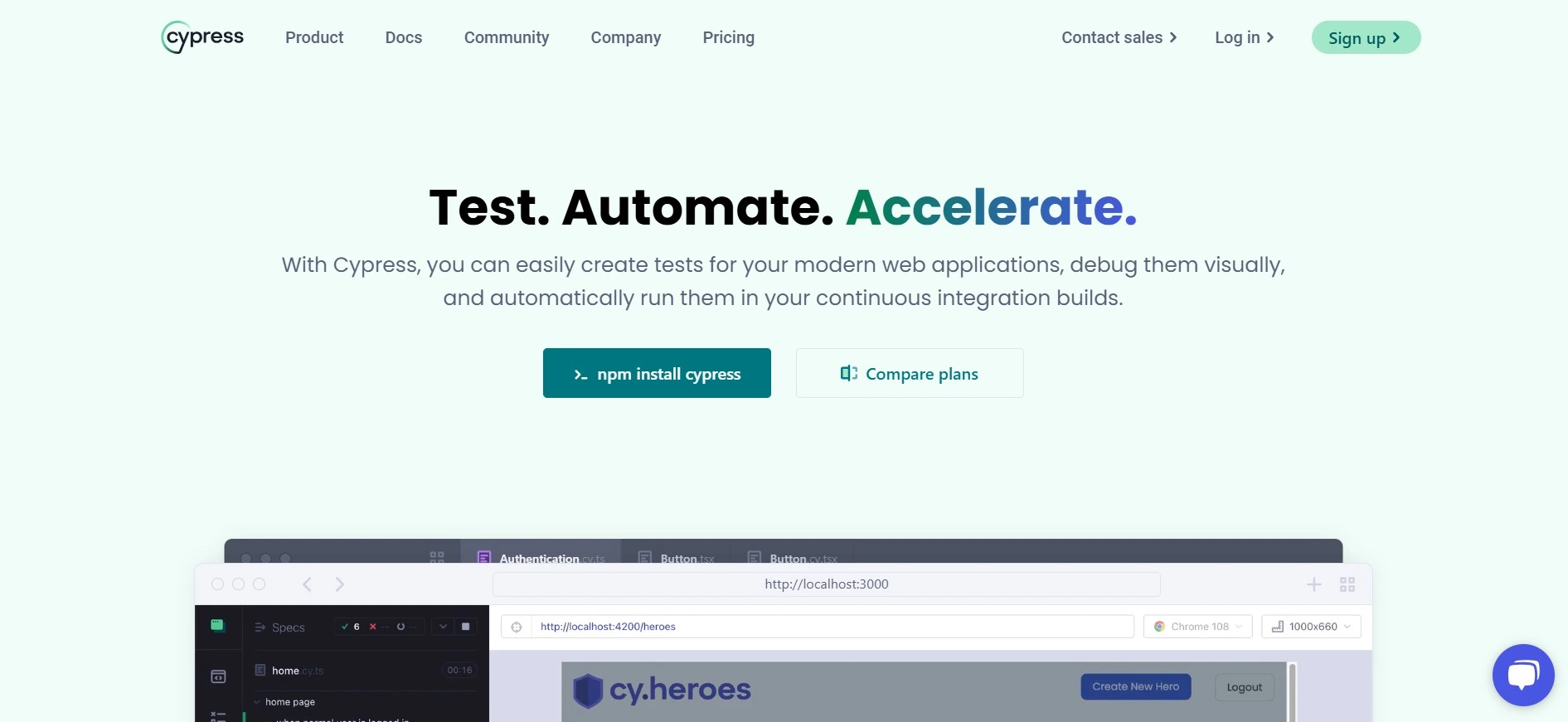
Cypress is a modern JavaScript-based end-to-end testing framework designed for the modern web.
Unlike traditional automation testing tools, Cypress operates directly within the browser, offering faster and more reliable test execution.
Key Features:
- Time-Travel Debugging: Visualize each test step, making debugging straightforward.
- Automatic Waiting: Eliminates the need for manual waits, reducing test flakiness.
- Real-Time Reloads: Instantly reflects code changes, accelerating the development cycle.
- Network Traffic Control: Stub and intercept API calls for comprehensive testing.
- CI/CD Integration: Smoothly integrates with tools like Jenkins and GitHub Actions.
Cypress stands out among the top automation testing tools for its developer-friendly approach and robust feature set.
It’s effective for frontend applications requiring rapid feedback loops.
5. Appium: Best for Mobile App Testing
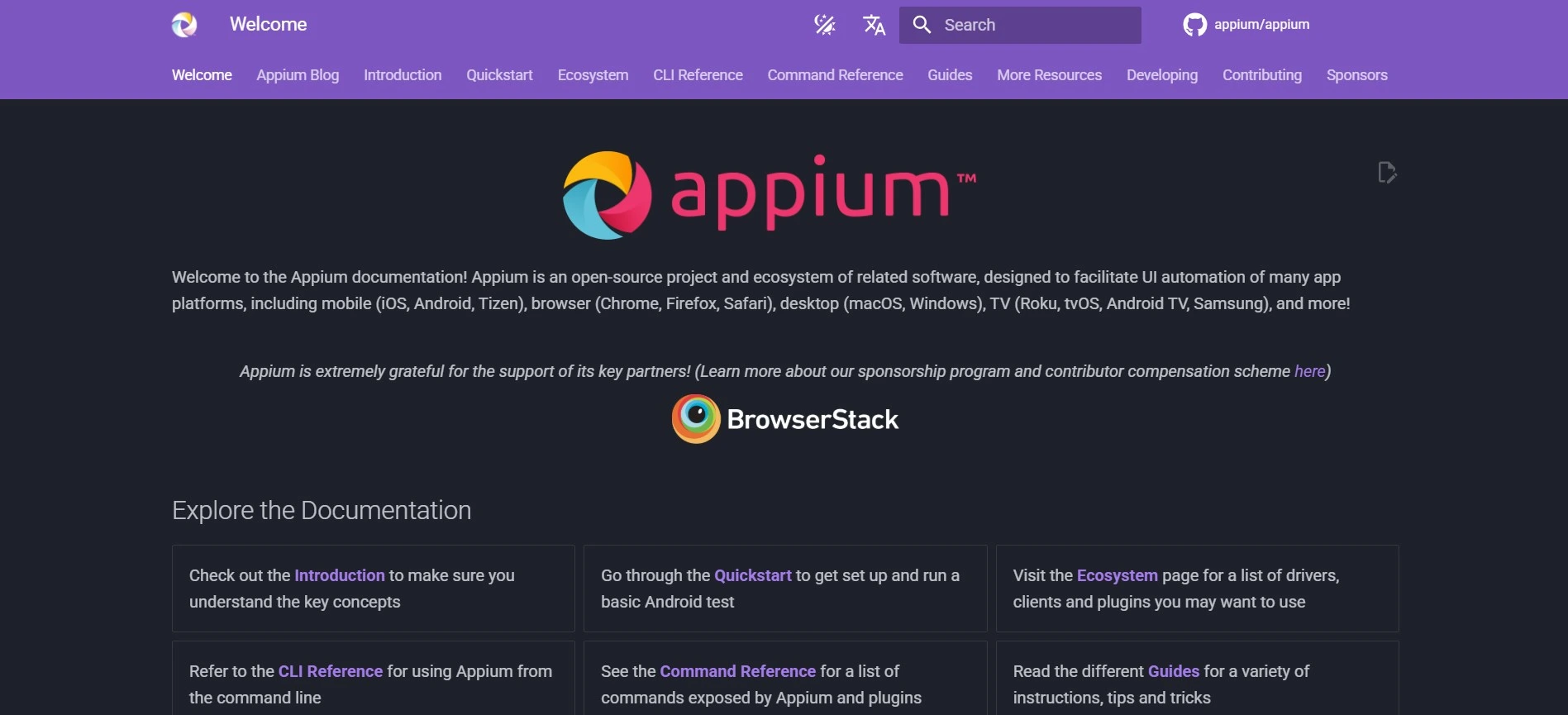
Appium is an open-source automation tool primarily used for testing mobile applications.
Its flexibility and extensive community support make it one of the best automation testing tools for mobile platforms.
Key Features:
- Cross-Platform Testing: Supports both Android and iOS platforms.
- Multiple Language Support: Allows writing tests in various programming languages like Java, Python, and Ruby.
- Real Device Testing: Enables testing on real devices, emulators, and simulators.
- Integration Friendly: Compatible with CI/CD tools and testing frameworks.
Appium is a go-to choice in the list of automation tools for software testing, especially for mobile application testing.
6. Katalon Studio: Best for All-in-One Test Automation
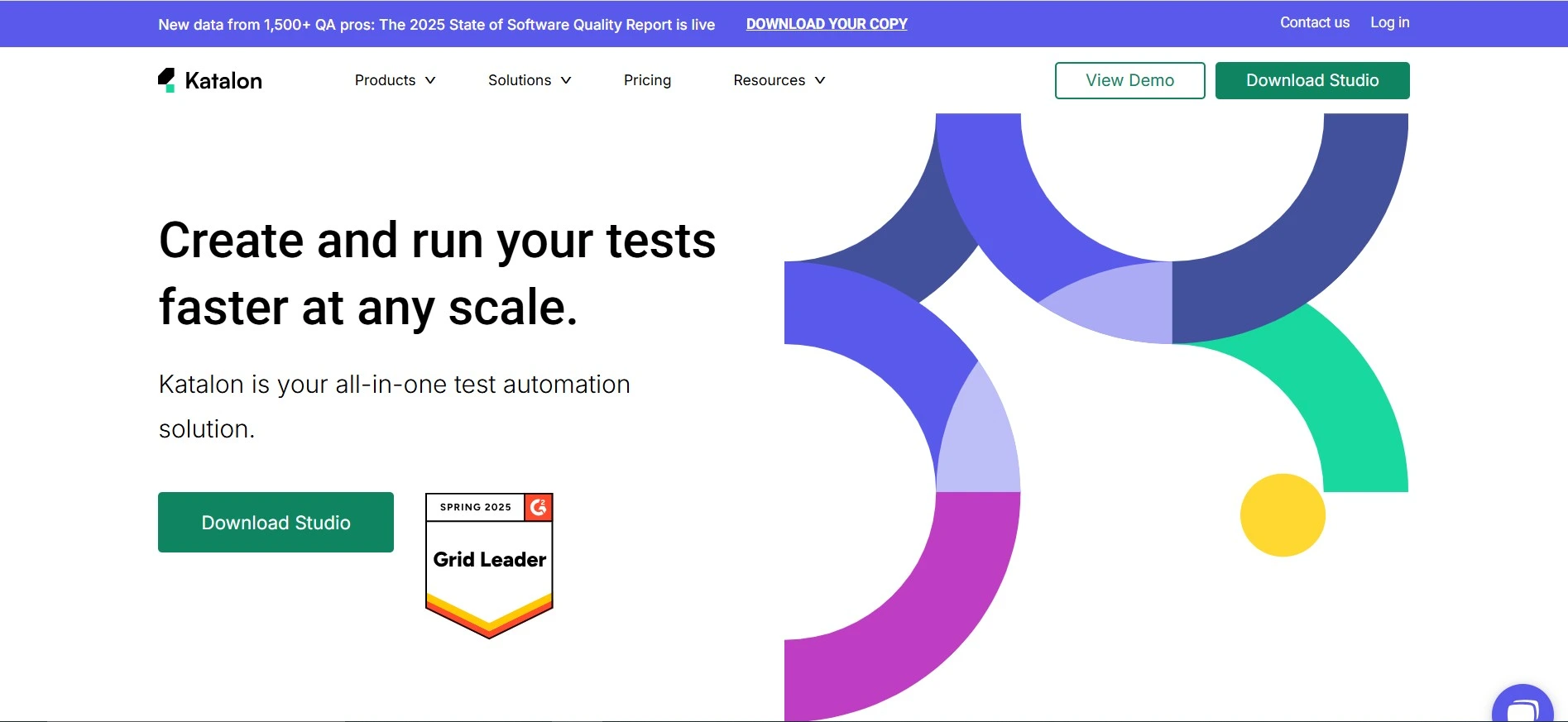
Katalon Studio is one of the most complete automation testing solutions that is being used by both beginners and experienced testers.
It combines the simplicity of a low-code platform with the flexibility of scripting, supporting web, API, mobile, and desktop application testing.
Key Features:
- All-in-One Platform: Supports various testing types, including functional, regression, and performance testing.
- Low-Code Environment: Offers a user-friendly interface with record-and-playback capabilities.
- Data-Driven Testing: Facilitates testing with multiple data sets for comprehensive coverage.
- CI/CD Integration: Integrates with tools like Jenkins, Azure DevOps, and GitLab.
- Extensive Reporting: Provides detailed test reports and analytics for better decision-making.
Katalon Studio is often highlighted in test automation tools comparison discussions for its balance between ease of use and advanced features, making it suitable for teams with varying levels of expertise.
7. ACCELQ: Best for AI-Powered Automated Testing
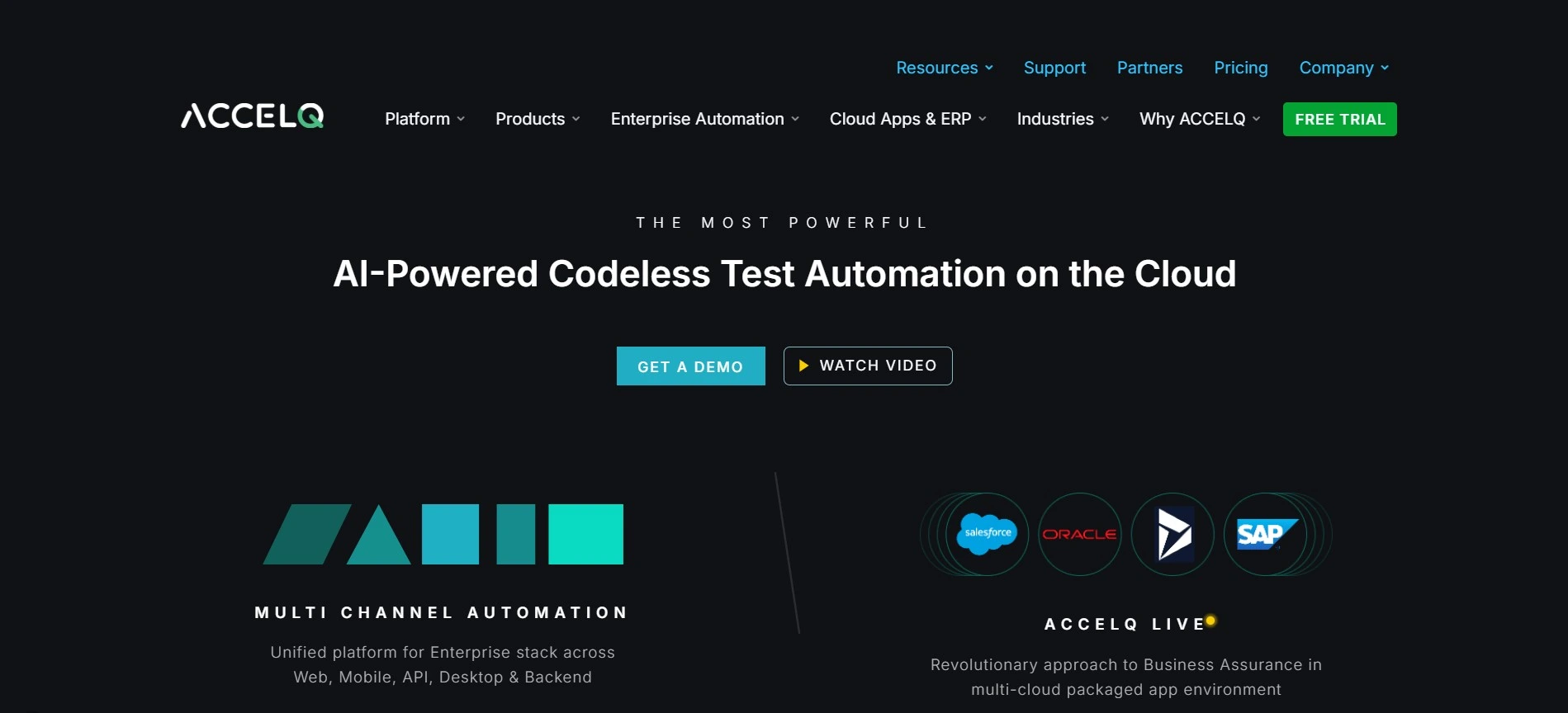
If you’re tired of patching together brittle test scripts and maintaining endless lines of code, ACCELQ brings a breath of fresh air.
It’s a no-code, cloud-based test automation platform that’s especially effective for Agile and DevOps environments.
Key Features:
- No-Code Simplicity: You don’t need to know Java or Python to write tests. Even business users can automate tests using natural language logic.
- End-to-End Automation: ACCELQ doesn’t just stop at UI tests. It handles web, API, and even database validations—all in one place.
- CI/CD Integration: ACCELQ connects effortlessly with Jira, Jenkins, and other DevOps tools, making it an essential part of any automation tools for software testing suite.
- AI-Driven Change Management: It automatically detects changes in your app and adapts your test cases, reducing
ACCELQ is ideal if you’re building enterprise-grade apps and want automation to move at the speed of your release cycles.
In the test automation tools comparison, it stands out for usability and intelligent adaptability.
8. Ranorex: Best for Desktop, Web, and Mobile Testing
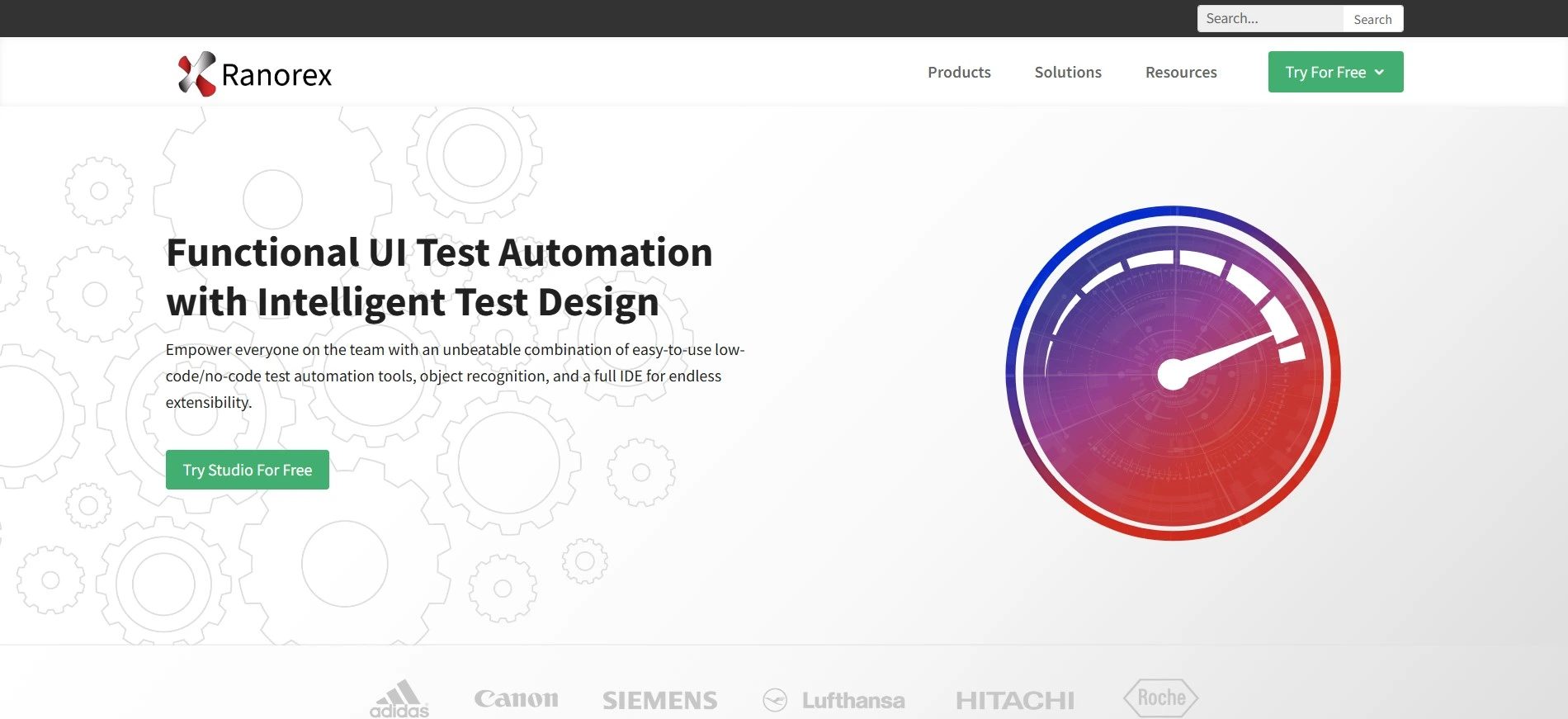
When your team is dealing with a mix of desktop, web, and mobile apps Ranorex Studio delivers the best solution.
It’s especially strong in Windows desktop automation and has deep support for legacy systems.
Key Features:
- Powerful UI Object Recognition: Its smart object recognition engine ensures your tests don’t break with every UI update.
- Codeless and Coded Options: Ranorex works for both technical testers and QA engineers with minimal coding experience.
- Detailed Reporting: Each test run comes with rich logs, screenshots, and performance metrics.
- Broad Tech Stack Support: Ranorex supports .NET, Java, HTML5, SAP, Oracle, Salesforce, and more.
In our experience working with industries that rely on heavy desktop integrations like manufacturing and finance, Ranorex Studio performs reliably and scales well with test complexity.
9. Leapwork: Best for No-Code Test Automation
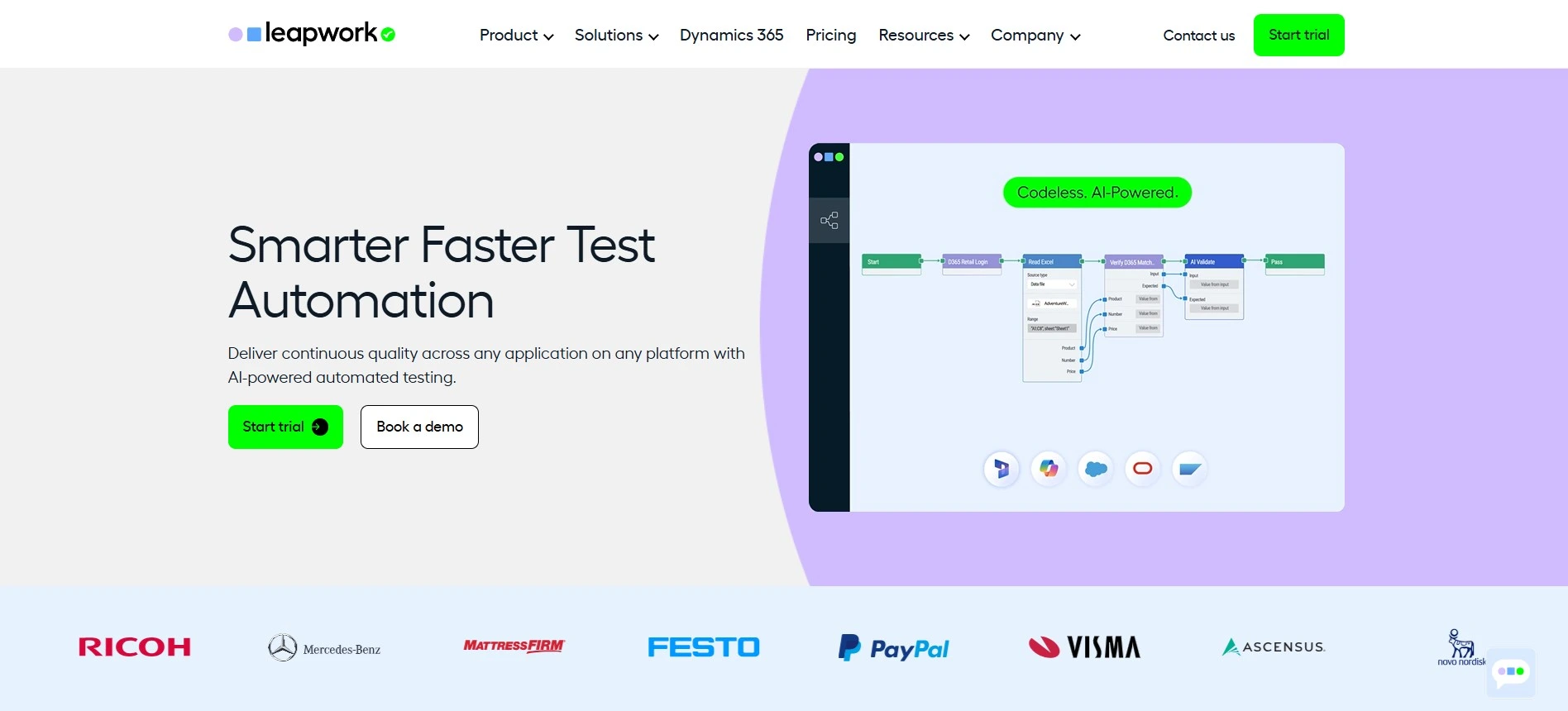
Not everyone who needs to build automated tests is a coder.
Leapwork solves that by offering a true visual test automation platform using flowcharts and logic blocks instead of code.
Key Features:
- Visual Flow Designer: Build test cases using drag-and-drop blocks instead of traditional scripting.
- Cross-Platform Testing: Automate tests across web, desktop, and virtual environments without switching tools.
- Reusability & Maintenance: Modularize your logic into reusable components that make large-scale automation easier to manage.
- Enterprise-Grade Security: Role-based access and audit trails make Leapwork a smart pick for regulated industries like healthcare and banking.
If you’re doing a test automation tools comparison and accessibility is your top concern, Leapwork is hard to beat especially for cross-functional teams with varying technical skill sets.
10. Tricentis Tosca: Best for Enterprise-Level Test Automation
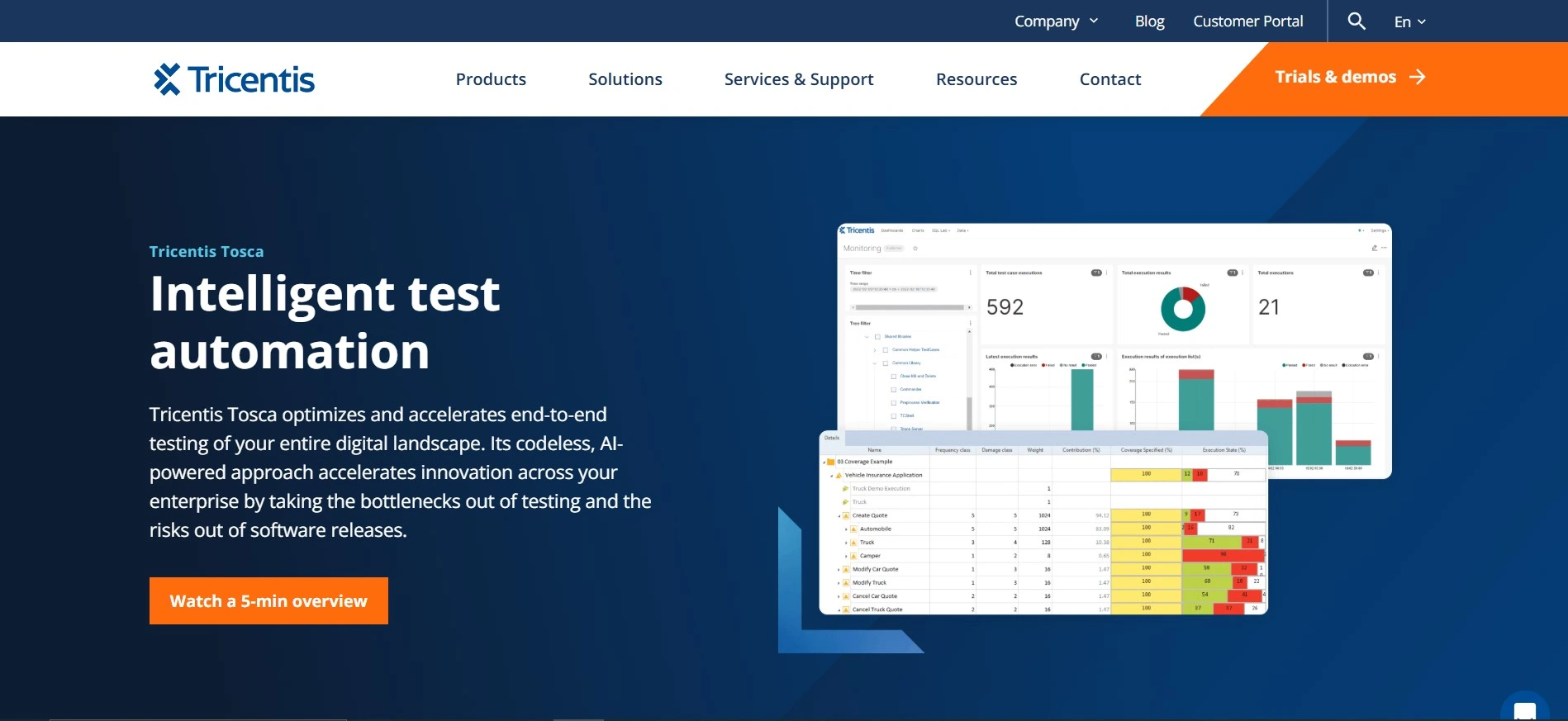
For large-scale enterprise applications especially SAP, Salesforce, and Oracle, Tricentis Tosca is a leader in continuous testing and model-based automation.
Key Features:
- Model-Based Test Automation: Instead of writing scripts, you create models of your application logic, which dramatically reduces maintenance.
- Risk-Based Testing: Tosca uses AI to prioritize test cases based on business risk.
- Extensive Tech Stack Support: From legacy systems to modern cloud apps, Tosca covers it all.
- Enterprise Ready: With built-in test case versioning, distributed execution, and integration with DevOps pipelines, Tosca is built for scale.
Tosca isn’t for small teams with basic testing needs.
But if you’re managing complex systems across business units, it’s arguably one of the best automation testing tools you can invest in.
These are the top 10 automation testing tools of 2025 that offer solutions for every testing need.
How We Build Bug-Free Software with Advanced Testing Tools?
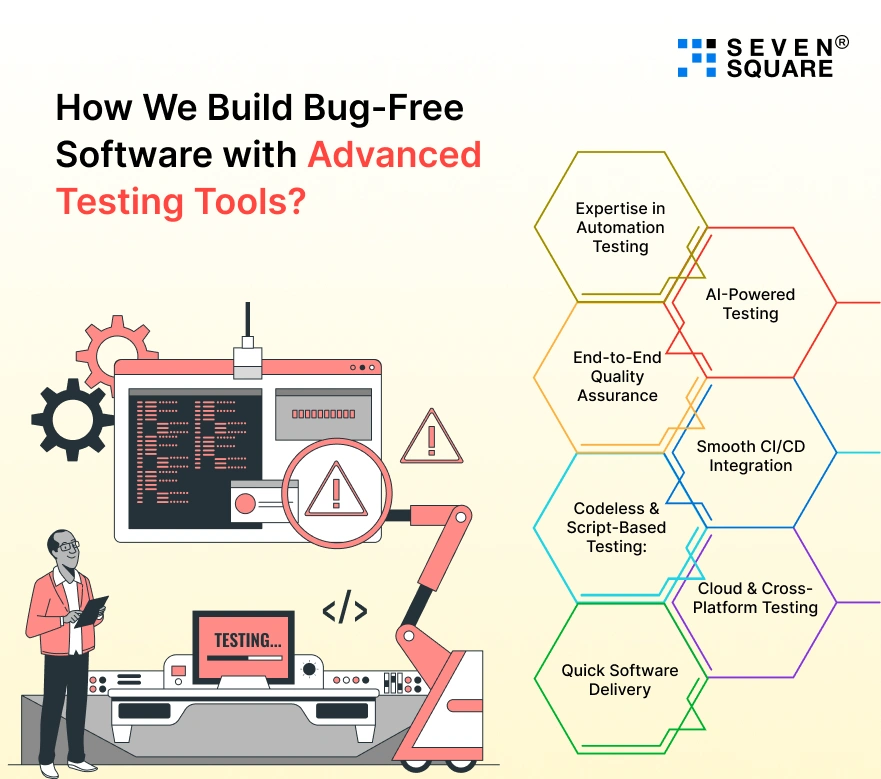
We don’t just build software but we ensure it’s flawless, fast, and future-ready with the best automation testing tools. Learn about our proficiency:
- Expertise in Automation Testing: Our team uses top software testing tools like Selenium, Cypress, and TestComplete to detect bugs before they impact users.
- AI-Powered Testing: We integrate AI-driven automation and self-healing test scripts to reduce errors and speed up delivery.
- End-to-End Quality Assurance: Whether it’s web, mobile, or enterprise software we use tools like Appium and Ranorex for automated UI testing.
- Smooth CI/CD Integration: Our testing solutions fit directly into your DevOps pipeline to ensure continuous testing and faster releases.
- Codeless & Script-Based Testing: From no-code tools like Leapwork to advanced scripting with Playwright we customize our approach based on your needs.
- Cloud & Cross-Platform Testing: We ensure your software works smoothly on various devices and browsers using cloud-based testing platforms.
- Quick Software Delivery: With automated test execution, we cut down testing time while improving accuracy and reliability.
In-Depth Comparison of the Top Automation Testing Tools
Choosing the right automation testing tool depends on different factors like cost, AI capabilities, ease of use, and integrations.
To make your decision easier you can see a detailed comparison of the best automation testing tools of 2025:
| Tool Name | Best For | Pricing | AI Features | Ease of Use | Integrations |
|---|---|---|---|---|---|
| Selenium | Web UI Testing | Free | No | Moderate | Yes |
| TestComplete | Codeless Automation | Paid | Yes | High | Yes |
| Playwright | Cross-browser Testing | Free | No | Moderate | Yes |
| Cypress | End-to-End Web Testing | Free/Paid | No | High | Yes |
| Appium | Mobile App Testing | Free | No | Moderate | Yes |
| Katalon Studio | All-in-One Test Automation | Free/Paid | Yes | High | Yes |
| ACCELQ | AI-Powered Automated Testing | Paid | Yes | High | Yes |
| Ranorex | Desktop, Web, and Mobile Testing | Paid | No | Moderate | Yes |
| Leapwork | No-Code Test Automation | Paid | Yes | High | Yes |
| Tricentis Tosca | Enterprise-Level Test Automation | Paid | Yes | Moderate | Yes |
Breaking It Down
- Pricing: While open-source tools like Selenium, Playwright, and Appium are free, premium tools like TestComplete and Tricentis Tosca offer advanced AI features and better support.
- AI Features: Tools like ACCELQ, TestComplete, and Tricentis Tosca leverage AI-driven testing to improve accuracy and efficiency.
- Ease of Use: Codeless testing tools like Leapwork, TestComplete, and Katalon Studio make automation easier for non-technical testers.
- Integrations: All tools support CI/CD pipelines, DevOps tools, and test management platforms, ensuring smooth workflow integration.
This comparison table gives you a quick and clear overview of the top software testing tools so you can find the best automation testing tools in 2025.
What’s New in Automation Testing? Future Trends You Need to Know
The world of automation testing tools is changing quickly because of AI, cloud computing, and codeless automation.
Here are the future trends of software testing in 2025 and beyond:
1. AI-Driven Testing: The Rise of Machine Learning in Software Testing
Artificial Intelligence (AI) is improving software testing tools by making them smarter and more efficient. AI-driven automation can:
- Analyze test results and predict failures before they happen.
- Automatically generate and optimize test cases.
- Identify flaky tests and reduce false positives.
Why It Matters: AI-powered testing reduces manual effort, speeds up testing, and ensures higher accuracy. Tools like ACCELQ and Tricentis Tosca are already leading.
2. Self-Healing Tests: Reducing Test Maintenance with Intelligent Automation
One of the biggest challenges in automated UI testing is test maintenance. Self-healing test automation helps by:
- Automatically detecting and fixing broken test scripts.
- Adapting to changes in UI elements without manual intervention.
- Reducing test flakiness and improving reliability.
Why It Matters: With self-healing tests, teams can spend less time fixing tests and more time improving software quality. Katalon Studio and TestComplete already offer this feature.
3. Cloud-Based vs On-Premise Automation Tools: Which One Should You Choose?
Modern software testing tools are moving to the cloud and offering better flexibility and scalability. But should you go cloud-based or stick to on-premise?
Cloud-Based Testing:
- Ideal for remote teams and scalable test execution.
- Faster test execution with parallel testing.
- Easily integrates with CI/CD pipelines.
On-Premise Testing:
- Better control over security and compliance.
- Suitable for organizations with strict data regulations.
- Works best when cloud connectivity is limited.
Why It Matters: Tools like Selenium Grid and Playwright support cloud testing so it becomes easier to run large-scale automated tests on multiple devices.
4. Codeless Test Automation: Is It the Future of Software Testing?
Traditional script-based test automation requires programming skills but codeless automation testing is making testing accessible to everyone.
- Allows testers to create automated tests using drag-and-drop interfaces.
- Reduces dependence on developers to make testing faster and easier.
- Speeds up test creation and execution even for non-technical users.
Why It Matters: Tools like Leapwork and TestComplete are improving codeless test automation to make it more user-friendly and efficient.
FAQs
- Automation testing tools are software applications that help testers execute test cases, compare results, and detect bugs without manual intervention.
- They improve efficiency, accuracy, and speed in software testing.
- Automation testing is faster, more reliable, and cost-effective compared to manual testing.
- It minimizes human errors & allows continuous testing, and supports parallel test execution across multiple devices and platforms.
- Some of the top automation testing tools in 2025 are:
- Selenium: Best for open-source automated UI testing
- TestComplete: Best for codeless test automation
- Appium: Best for mobile app testing
- Katalon Studio: Best for all-in-one test automation
- ACCELQ: Best for AI-powered test automation
- Yes, many automation testing tools provide free and budget-friendly solutions for small teams.
- Selenium, Playwright, and Cypress are great open-source options while tools like Leapwork and Katalon Studio provide codeless automation for beginners.
- Yes, most modern automation testing tools smoothly integrate with DevOps pipelines to allow continuous testing in Jenkins, GitHub Actions, and Azure DevOps.